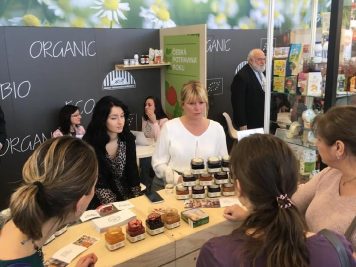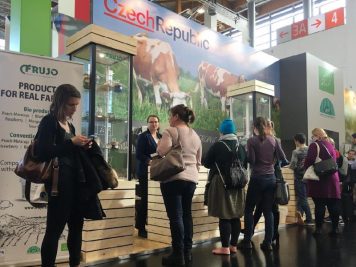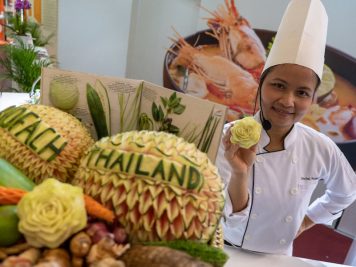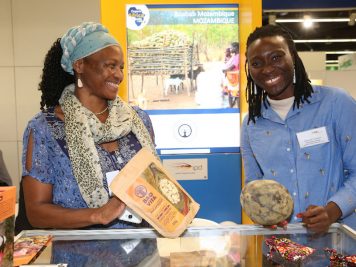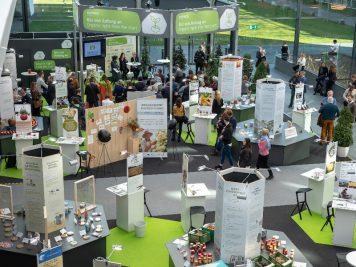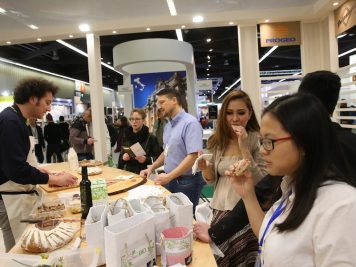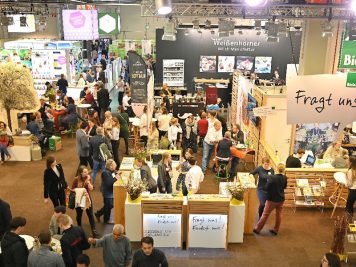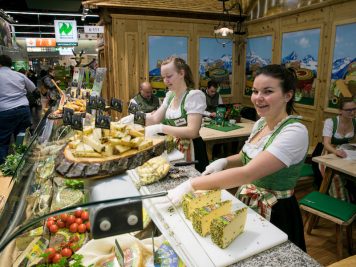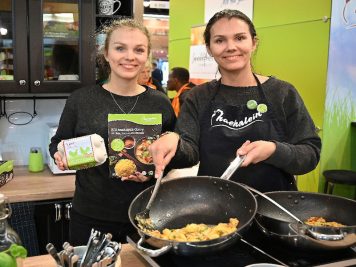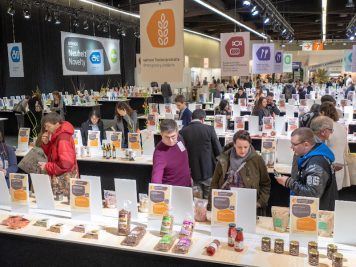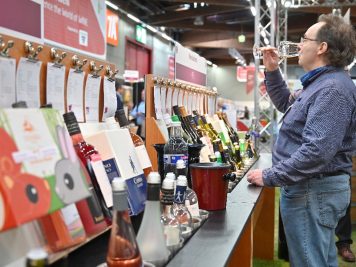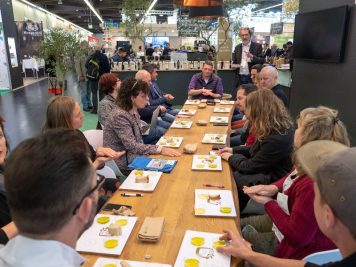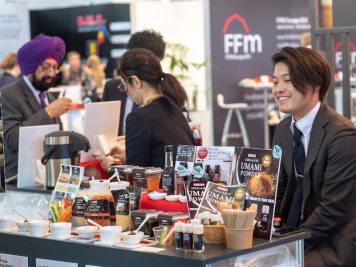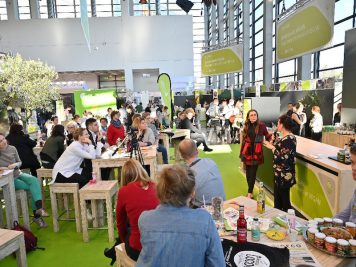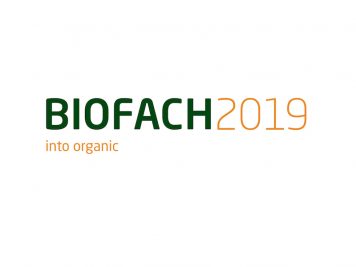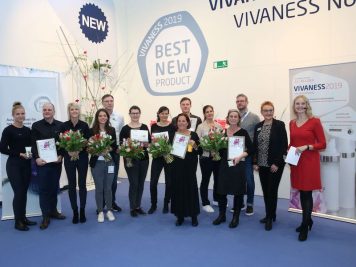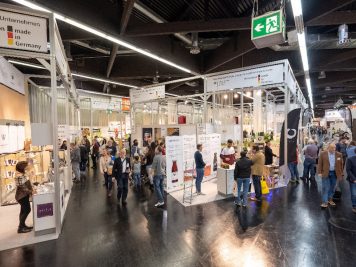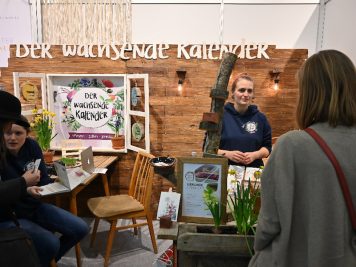In Nuremberg, the BIOFACH organic food trade fair and the VIVANESS Natural Cosmetics Fair were held from 13 to 16 February. The largest European organic food fair celebrated its 30th anniversary with a record number of exhibitors: 2989 at Biofach and 284 at Vivaness, a total of 3273 exhibitors from 98 countries. Botswana and the Comoros made their debut at BIOFACH, while the Philippines and Serbia represented for the first time at VIVANESS.
Trends at BIOFACH: vegetarian / vegan diet, protein products, convenience (semi-finished products) and zero-waste products.
Vegetarian and vegan products continue to be a significant trend, that is also reflected at the BIOFACH Novelty Stand. In addition to classical vegan ingredients such as soy, customers are also thrilled with cashew nuts, almonds or peas. Protein-containing foodstuffs, whether in the form of oils, rods, spreads or cocktails, are also popular. Another sustained trend is for uncomplicated meals that are quickly prepared. Convenience products are now an integral part of the range offered by the organic segment. However, more and more consumers also focusing on „external values”, i.e. packaging. Innovative packaging, just like the “unpackaged” concepts under the category „zero-waste”, is a significant issue in the sector. Trending are turmeric and other exotic flavours as well as kimchi, the lactic fermented vegetable typical of Korean cuisine. Vegetarian offer was presented by 1245 exhibitors and 1345 by the vegan. Also, worth mentioning are gluten-free and lactose-free segments (1,200 and 890 exhibitors), as well as raw food (a food not modified at more than 45 ° C) presented by 561 exhibitors.
Trends at VIVANESS include probiotic cosmetics, Nordic beauty and also zero-waste products.
Bio from all over the world
BIOFACH presents organic food from all over the world in all its variety. The VEGAN, WINE and OLIVE OIL products have their own dedicated worlds. In addition to presentations, tastings and a specialized accompanying program took place. In the experiential worlds of OLIVE OIL and WINE, the best products were awarded the Olive Oil International Award for Oils and MUNDUS VINI BIOFACH for Organic Wine.
New Trends
Biofach: A total of 541 new products were introduced, the trade visitors voted for their favourites to win the Best New Product Award in seven categories. Five German products won and one from Austria and Poland: Käserebellen GmbH Pumpkin cheese (fresh products), Schrozberger Milchbauern Ice cream (frozen products). In the category of Dried Cooking and Baking Products, Georg Thalhammer received awards for Pesto seaweed-wild garlic. HANS Coffee & Berry from HANS Brainfood won the award in the other dried products category. In the non-food products Primoza, impressed the trade visitors with The Growing Calendar. After the leaves have been squeezed at the end of the month, the seeds can be planted. Austria has won Landgarten Almond with Rose Blossom in chocolate, forest fruits and cherries in chocolate in the category of dried products and sweets. In the category of drinks, the Polish company Nutracevit was awarded for BIOHASKAP, pure haskap superberry juice.
Vivaness showed 155 new products in 6 categories won by German companies: Black soap with activated carbon from SPEICK Naturkosmetik in face care, in the category of body care was awarded Weleda for Skin Food Serie (butter on body and lips), Benecos dominated decorative makeup cosmetics, special cosmetics reigned Speick Naturkosmetik sunbathing, Denttabbs with dental tablets scored in drugstore, Wellness was the best Coscoon Cosmetics with body butter. Danish company Unterkram won hair shampoo with Green Matcha shampoo.
BIOFACH and VIVANESS Congress is the biggest international congress for the organic food and organic cosmetics sectors. There were over 9500 participants in 139 meetings in six forums. Congress focused on the relationship between agriculture, processing, nutrition and health. The main congress topic was: “The organic system –healthy in a holistic approach.” The congress will cover topics like biodiversity, soil health, clean water, wild plants, animal welfare and nutritional choices.
Visitors and exhibitors
The fair was visited by 51500 professional visitors from 143 countries, half of the visitors were German. There were 797 visitors from the Czech Republic. The largest number of exhibitors was Germany 1020, followed by Italy 423, Spain 220, and France 213. In 2020 the fair will expand in the two most modern exhibition halls, designed by Zaha Hadid Architects.
Czech Republic at the fair
At the end of 2018, more than 4600 farms ecologically managed in the Czech Republic with over 520 thousand ha, represented 15% of farmed land. The average size of the Czech ecofarm was 119 hectares. In the EU we have the third largest ecofarm on average.
Production of Organic Farming in the Czech Republic
The total production of organic farms in 2017 is estimated at CZK 6768 million, representing a 5.1% of the total agricultural production. Unfortunately, about half of the ecofarm production (grain, milk, meat) is exported abroad. The rest remains in the Czech Republic and is used for food production, but only a part of it is used in the bio-quality market. Due to the low demand of Czechs for organic food, a number of bio-materials end up in common foods. On the Czech market, processed foods such as baby food, coffee and tea, as well as milk, dairy products, fruits are the most sold.
Market and consumption of organic food
The total organic food turnover of Czech subjects reached CZK 4.19 billion in 2016. Of this, consumers in the Czech Republic spent 2.55 billion CZK on organic food. Organic food producers are already 750. Almost 40% of the total turnover of organic food was exported (goods for CZK 1.64 billion), compared to imports of organic food from abroad. The average annual per capita consumption increased to CZK 241 (in the EU it was 54 euros) and the share of organic food in the total consumption of food and drinks reached 0.9% (in the EU already 7%). Andrea Hrabalová from the Czech Technology Platform for Organic Farming explains: “Average Czechs spend six times less on organic food than the average European, and after 30 years of organic farming in the Czech Republic they still do not know why to buy domestic organic food. It is clear from experience from other countries that the main driver of EZ development is not subsidies but long-term and conscious consumer demand.” Our organic farming is doing well and is not lost in the world. Europe has 350,000 biofarms and 2.4 million worldwide. Domestic bioproduction would potentially make four times more biofoods than it is today.
Photos by: NürnbergMesse
Text by: Jaromír Hampl


